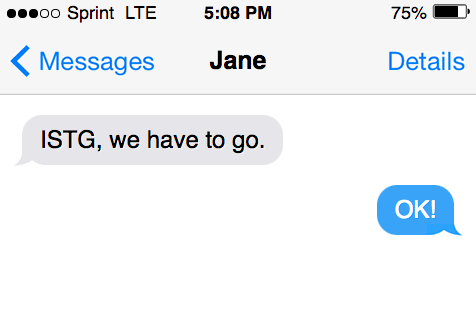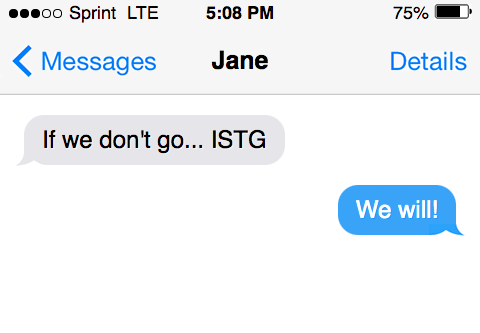What does “ISTG” mean over text? Abbreviations that get used over text messages can be confusing to decode. Thanks to the internet, the English language is evolving. And common phrases are turning into abbreviations in order to save time and keystrokes.
Learn what “ISTG” means in this short guide…
“ISTG” meaning and definition
“ISTG” stands for “I Swear To God.” This is a phrase that gets used when someone wants to make a promise or a type of swear to God. Typically, a person would say this expression when they want to add emphasis to an idea, concept, or opinion.
For example, a scenario could be two friends who are making a promise to each other. One friend would ask, “Are you going to follow through on your promise?” The second friend would reply, “I swear to God that I will.” Given the context, it could get used as a type of contract or promise.
Secondarily, it could get used to express annoyance. Common ways to use “ISTG” are when faced with skepticism. For example, “ISTG, I can get it done.”

Capitalization
The slang term and abbreviation “ISTG” is typically spelled in ALL CAPS or all lowercase letters.
Correct: ISTG
Correct: istg
Incorrect: iSTG
Usage
Use of the abbreviation can be found in the following places.
Social media platforms: Snapchat, Instagram, Twitter, TikTok, and more.
Social media posts: Instagram stories, TikTok stories, and more.
Text messaging: One-on-one and group chats.
Internet forums: Chat rooms, Discord, and other online conversations.
Intention (Synonyms)
The acronym intends to communicate the following:
- Annoyance
- Annoyed
- Promise
- Swear
History of “ISTG”
Urban Dictionary dates the abbreviation “ISTG” back to 2007. Making it an older abbreviation used on the internet. The term has never had other meanings associated with the “ISTG” abbreviation.
Acronyms like “ISTG” have gained in popularity due to text messaging. And the inability to express emphasis through digital conversations.

Examples of “ISTG” getting used in a conversation
Here are examples where “ISTG” can get used in a conversation:
Example one
Friend 1: “I don’t think I can make it to the party tonight.”
Friend 2: “ISTG, if you can’t go it’s going to be extremely boring.”
In this example, the second friend uses “ISTG” to convey emphasis or disappointment. The information getting provided to the first friend is a surprise. They are making the “ISTG” use as a type of emotion (express frustration).
Example two
Friend 1: “Did you drop my books, or was that someone else?”
Friend 2: “ISTG, it wasn’t me.”
This conversation has the second friend using “ISTG” to convince the other person of the truth. They are making a contract to God. The slang abbreviation is getting used to talk the other person into believing their statement.
Example three
Friend 1: “ISTG, if the professor doesn’t give us our books today I’m going to be upset.”
Friend 2: “I’m sure he will. School is about to start.”
Lastly, this example shows a person using “ISTG” to express annoyance. In this case, the person is suggesting that they are annoyed they did not receive their books for class.
Similar short forms and abbreviations
Other ways to make yourself sound sincere or express annoyance:
S2G: Meaning to “swear to God” again. In this format, the person is using the number “2” to represent the infinitive verb “to.”
TBH: Or “to be honest.” This is a way of trying to convince someone about an opinion. The example sentence would be, “TBH, I don’t think you should do that.”
IMO: Meaning “In My Opinion.” This is a way to soften an idea so that another person can share a contradicting view point.
IMHO: Standing for, “In My Honest Opinion” or “In My Humble Opinion.” This is very similar to “IMO,” but includes the word “honest/humble” to add additional emphasis for the reader.
Conclusion
“ISTG” is an informal way to express emotion. It is not used in business settings. And should get used over text messaging, social media, and other digital communication platforms. Use the abbreviation to express being annoyed, frustrated, or exhausted.
Sources
Inside this article
Fact checked:
Content is rigorously reviewed by a team of qualified and experienced fact checkers. Fact checkers review articles for factual accuracy, relevance, and timeliness. Learn more.
Core lessons
Glossary
- Abstract Noun
- Accusative Case
- Anecdote
- Antonym
- Active Sentence
- Adverb
- Adjective
- Allegory
- Alliteration
- Adjective Clause
- Adjective Phrase
- Ampersand
- Anastrophe
- Adverbial Clause
- Appositive Phrase
- Clause
- Compound Adjective
- Complex Sentence
- Compound Words
- Compound Predicate
- Common Noun
- Comparative Adjective
- Comparative and Superlative
- Compound Noun
- Compound Subject
- Compound Sentence
- Copular Verb
- Collective Noun
- Colloquialism
- Conciseness
- Consonance
- Conditional
- Concrete Noun
- Conjunction
- Conjugation
- Conditional Sentence
- Comma Splice
- Correlative Conjunction
- Coordinating Conjunction
- Coordinate Adjective
- Cumulative Adjective
- Dative Case
- Determiner
- Declarative Sentence
- Declarative Statement
- Direct Object Pronoun
- Direct Object
- Diction
- Diphthong
- Dangling Modifier
- Demonstrative Pronoun
- Demonstrative Adjective
- Direct Characterization
- Definite Article
- Doublespeak
- False Dilemma Fallacy
- Future Perfect Progressive
- Future Simple
- Future Perfect Continuous
- Future Perfect
- First Conditional
- Irregular Adjective
- Irregular Verb
- Imperative Sentence
- Indefinite Article
- Intransitive Verb
- Introductory Phrase
- Indefinite Pronoun
- Indirect Characterization
- Interrogative Sentence
- Intensive Pronoun
- Inanimate Object
- Indefinite Tense
- Infinitive Phrase
- Interjection
- Intensifier
- Infinitive
- Indicative Mood
- Participle
- Parallelism
- Prepositional Phrase
- Past Simple Tense
- Past Continuous Tense
- Past Perfect Tense
- Past Progressive Tense
- Present Simple Tense
- Present Perfect Tense
- Personal Pronoun
- Personification
- Persuasive Writing
- Parallel Structure
- Phrasal Verb
- Predicate Adjective
- Predicate Nominative
- Phonetic Language
- Plural Noun
- Punctuation
- Punctuation Marks
- Preposition
- Preposition of Place
- Parts of Speech
- Possessive Adjective
- Possessive Determiner
- Possessive Case
- Possessive Noun
- Proper Adjective
- Proper Noun
- Present Participle
- Prefix
- Predicate



